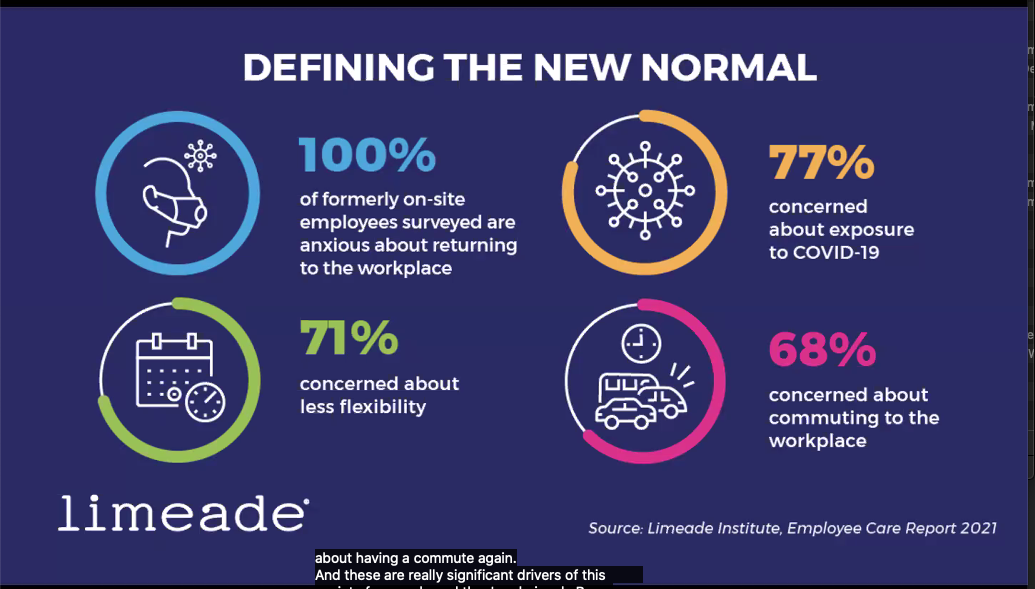
What about remote work has museum leaders so afraid?
If you're reading this and not a subscriber to Museum Human, consider scrolling to the bottom and signing up now—it's free and is the only way to read the site's longer weekly post on the organizational culture of cultural organizations. (If the subscription box is not visible at the lower right, please try a different browser or turn off blockers for the moment.)
Recently I watched a webinar from the website Quartz about returning to work. (Quartz is worth reading, though much of it is paywalled; I consider an annual membership worth the cost.) One thing I appreciate about Quartz is its mix of business and worker focus; one slide, focusing on worker anxiety, stuck with me:

There were other points made during the webinar that echo those I've provided in this blog, such as:
- Some workers feel that they're being asked their opinions about remote work but not getting to be part of the decision.
- Workers feel that they're the ones figuring out how to manage and excel during remote work, but the leaders back at the office are the ones dispensing "tips and practices for effective remote work."
- In-office work benefits extroverts over introverts. (This is a topic which I'll deal with in an upcoming post; both introverts and extroverts feel that workplace dynamics benefit the other type, a pattern which is a classic hallmark of a toxic organization.)
Speaking of fear, in other remote-and-return-to-work articles, here's The Atlantic on people who just don't want to go back into society (as opposed to the "I'm vaxxed everyone I know is vaxxed it's back to normal!" narrative). After all, there's plenty for workers to fear besides covid in toxic workplaces steeped in white patriarchal supremacy, from sexual harassment to racism.
Fortune has this good article on the confirmation and cognitive biases of leaders as they plan for workers to return. This is an important point:
Leaders frequently proclaim that people are their most important resource. Yet the leaders resistant to permitting telework are not living by that principle. Instead, they’re doing what they feel comfortable with, even if it devastates employee morale, engagement, and productivity; seriously undercuts retention and recruitment; and harms diversity and inclusion. In the end, their behavior is a major threat to the bottom line.
Later on, the article adds:
Many people feel a desire to go back to the world before the pandemic. They fall for status quo bias, a desire to maintain or get back to what they see as the appropriate situation and way of doing things.
A major factor in leaders wanting everyone to return to the office stems from their personal discomfort with work from home. They spent their career surrounded by other people. They want to resume regularly walking the floors, surrounded by the energy of staff working.
Sounds like "hallway conversation delusion syndrome"? (See what a Medium article says about what's driving bosses to distraction.) But it reveals that while workers are concerned for themselves and their families (aside from whatever they may enjoy about being at home), leaders are concerned with maintaining leadership. I'm not saying that no museum leaders care about their workers, but the balance doesn't always tip the humans' way.
Harvard Business Revivew has constant coverage of hybrid work, but I liked two articles on what workers want most and five myths of flexible work, the latter addressing the losses that bosses are afraid of:
- Loss of control
- Loss of culture
- Loss of collaboration
- Loss of contribution
- Loss of connection
This article from Medium listed more reasons workers came up with as to why bosses need workers back in the office. Vice had a piece about how the worker relationship to busyness has changed; are leaders thinking of activity levels when they demand workers return to the office?
McKinsey had this interview with anthropologist and Financial Times editor Gillian Tett (also the author of the interesting book The Silo Effect), a deeper dive into the workplace psychology and fears which are driving the enforced return. (Here's another McKinsey article on hybrid workplace culture.)
I'll end with a Quartz article on Zoom's workplace transition, and some advice from HBR for leaders who need to lead themselves first! Here are some additional HBR pieces about the post-pandemic workplace and avoiding a return to old routines, plus some I've linked to before on fairness and psychological safety.
Enjoy the links, and may whatever arrangement your workplace has made be one that provides for your safety. I share your anxiety and hope that humanism prevails in our workplaces. Hope, after all, is one step from action.
If you're reading this and not a subscriber to Museum Human, consider signing up for a free subscription below—it's the only way to read the site's longer weekly post on the organizational culture of cultural organizations. (If the subscription box is not visible at the lower right, please try a different browser or turn off blockers for the moment.) Thank you for reading!
cover image by Tamanna Rumee on Unsplash [description: a circle of paper clips on a blue background]

Links of the Week: July 1, 2021: Fear Itself by Robert J Weisberg is licensed under a Creative Commons Attribution-NonCommercial-ShareAlike 4.0 International License.






